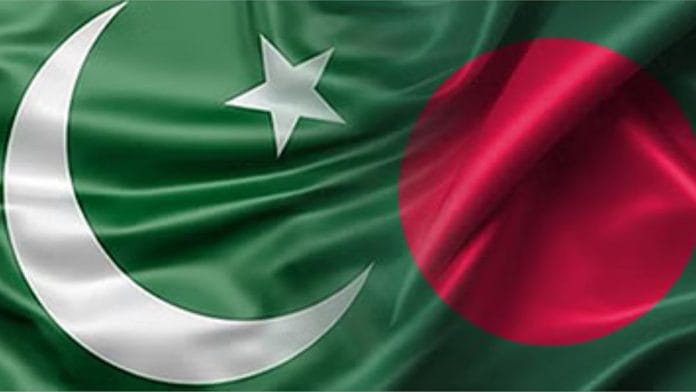New Delhi: Days after a high-ranking general of the Bangladesh Army completed an Islamabad trip, a high-level delegation from Pakistan’s Inter-Services Intelligence (ISI), led by Major General Shahid Amir Afsar, is in Dhaka for a four-day visit from 21 to 24 January.
These engagements mark one of the first between the ISI and Bangladeshi officials in decades. One of the last publicly known meetings happened in 1989 between then ISI chief Hamid Gul and General Hussain Muhammad Ershad of Bangladesh.
Maj Gen Jahangir Alam, Director General of the Directorate General of Forces Intelligence, the military intelligence unit of the Bangladesh Armed Forces, has invited the delegation of Pakistani Brigadiers Alam Amir Awan and Muhammad Usman Zatif.
Strengthening military and intelligence cooperation, regional security issues, and enhancing intelligence-sharing mechanisms are on the agenda, it is learnt.
Earlier, Lieutenant General Kamr Ul Hasan, Principal Staff Officer of the Armed Forces Division of Bangladesh, visited Rawalpindi, where he met Army Chief General Asim Munir, focussing on enhancing military ties and insulating their cooperation from external disruptions.
The meeting marked a high point in a series of high-level exchanges between the two countries, including diplomatic engagements at international forums.
Post-meet, a press release by Inter-Services Public Relations, the media and public relations wing of the Pakistan Armed Forces, called the countries “brotherly nations”.
Pakistani Prime Minister Shehbaz Sharif met Muhammad Yunus, the head of Bangladesh’s interim government, in Cairo last month. Next month, Ishaq Dar will be the first Pakistani Foreign Minister to visit Bangladesh since 2012, suggesting a shift in South Asia’s geopolitical dynamics.
In addition, just three weeks after the resignation of Bangladesh Prime Minister Sheikh Hasina and the installation of a new interim government, Dhaka placed an order with Pakistan for a fresh supply of artillery ammunition for guns capable of targeting ranges between 30 to 35 kilometres. In response, the export division of the Pakistan Ordnance Factory board instructed its factories to ramp up production.
Growing bilateral relations
The growing relationship between Pakistan and Bangladesh is seen as part of a broader geopolitical shift underpinned by a shared anti-India sentiment in both countries. In recent months, Pakistan and Bangladesh have edged closer politically, especially after Sheikh Hasina’s removal from power in August last year amid mass protests.
The historical tensions between the two countries stem from the 1971 Bangladesh Liberation War. While Pakistan officially recognised Bangladesh’s independence in 1974, unresolved issues persist, including the lack of a formal apology for the atrocities and disputes over the repatriation of Urdu-speaking individuals and the division of pre-1971 assets.
During his recent meeting with Sharif, Yunus urged Pakistan to resolve these long-standing issues, emphasising its importance for future generations.
In a broader regional context, Bangladesh’s growing relationship with Pakistan comes as India seeks to engage with Afghanistan’s Taliban ruler, raising tensions with Pakistan, which has historically maintained close ties with the Taliban.
As part of a broader thaw in bilateral relations between Pakistan and Bangladesh, the interim government of Bangladesh, in December last year, removed the requirement for Pakistani citizens to obtain a security clearance before applying for a Bangladeshi visa.
This shift in policy came a day before Pakistan’s high commissioner to Bangladesh, Syed Ahmed Maroof, met with Khaleda Zia, the leader of the Bangladesh Nationalist Party, in Dhaka.
Additionally, on 19 November, a Pakistani cargo ship docked at Bangladesh’s Chittagong Port for the first time since 1971, marking a shift in economic and diplomatic ties.
(Edited by Madhurita Goswami)
Also Read: An open letter to Prof Muhammad Yunus






